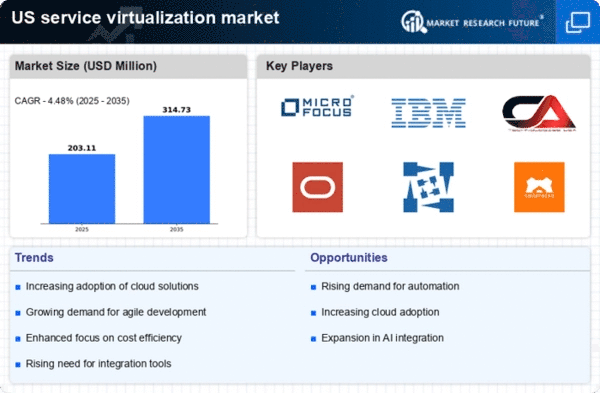Emphasis on Faster Time-to-Market
The service virtualization market is increasingly driven by the need for faster time-to-market for new products and services. In a competitive landscape, organizations are under pressure to deliver innovations rapidly while maintaining high quality. Service virtualization enables teams to conduct parallel development and testing processes, significantly reducing the time required to bring new offerings to market. By simulating services, organizations can identify and resolve issues early in the development cycle, thereby accelerating the overall timeline. This emphasis on speed is particularly relevant in sectors such as technology and retail, where consumer expectations are constantly evolving. As companies strive to enhance their agility, the service virtualization market is likely to benefit from this focus on expediting product launches.
Growing Demand for Cost Efficiency
The service virtualization market is experiencing a notable surge in demand for cost efficiency among organizations. As businesses strive to optimize their operational expenditures, service virtualization offers a compelling solution by enabling the simulation of services without the need for extensive physical infrastructure. This approach can lead to a reduction in costs associated with hardware, maintenance, and resource allocation. According to recent estimates, organizations can save up to 30% on development and testing costs by implementing service virtualization. This trend is particularly pronounced in sectors such as finance and healthcare, where budget constraints are prevalent. Consequently, the drive for cost efficiency is likely to propel the growth of the service virtualization market, as companies seek to leverage these technologies to enhance their financial performance.
Growing Adoption of DevOps Practices
The service virtualization market is witnessing a growing adoption of DevOps practices, which emphasize collaboration between development and operations teams. This cultural shift is aimed at improving the efficiency and quality of software delivery. Service virtualization aligns well with DevOps principles by enabling teams to work in parallel and reduce dependencies on physical services. By simulating services, organizations can enhance their testing capabilities and streamline their workflows. The rise of DevOps is reflected in the increasing number of organizations implementing these practices, with estimates suggesting that over 70% of companies in the US are adopting DevOps methodologies. This trend is likely to further drive the demand for service virtualization solutions, as businesses seek to enhance their operational efficiency and responsiveness.
Rising Complexity of IT Environments
The service virtualization market is being shaped by the increasing complexity of IT environments, which often consist of diverse applications, services, and platforms. As organizations expand their digital footprints, managing these intricate systems becomes challenging. Service virtualization provides a means to simplify this complexity by allowing teams to simulate services and interactions without the need for full integration. This capability is particularly valuable in environments where multiple services must work together seamlessly. The demand for service virtualization is expected to grow as organizations seek to streamline their IT operations and enhance collaboration among development and testing teams. This trend is indicative of a broader movement towards more efficient IT management practices within the service virtualization market.
Increased Focus on Digital Transformation
The service virtualization market is significantly influenced by the ongoing digital transformation initiatives across various industries. Organizations are increasingly adopting digital technologies to improve their processes, enhance customer experiences, and remain competitive. Service virtualization plays a crucial role in this transformation by allowing companies to create virtual environments that mimic real-world services, thereby facilitating faster development cycles and more efficient testing. In the US, the digital transformation market is projected to reach $1 trillion by 2025, indicating a robust growth trajectory. This shift towards digital solutions is likely to drive the adoption of service virtualization, as businesses recognize the need for agile and scalable solutions to support their evolving digital strategies.
















